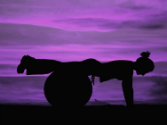 I read an article recently about busting some of the myths of exercise. One of these myths was the “No pain, No gain” theory. The writer was referring to the false idea that in order to gain anything from exercise, a workout needed to hurt. It doesn’t, he explained. Most people understand this; we know that exercise shouldn’t “hurt” us. When we workout, we should not push past pain that could result in injury or exacerbate soreness or pain that could lead to injury. That being said, the proverbial phrase “No pain, No gain” is a true and significant one if we want to improve ourselves through exercise.
I read an article recently about busting some of the myths of exercise. One of these myths was the “No pain, No gain” theory. The writer was referring to the false idea that in order to gain anything from exercise, a workout needed to hurt. It doesn’t, he explained. Most people understand this; we know that exercise shouldn’t “hurt” us. When we workout, we should not push past pain that could result in injury or exacerbate soreness or pain that could lead to injury. That being said, the proverbial phrase “No pain, No gain” is a true and significant one if we want to improve ourselves through exercise.
If we have been exercising for any length of time, most of us know what our “pain” threshold is. When I hop on the elliptical and chat with someone next to me for 45 minutes, I’m pretty sure that any threshold to pain is far from being reached. My heart rate may have gone up at times during the workout, but overall I didn’t stretch myself or lengthen any threshold. The same thing could be said for the four mile run that I could probably do in my sleep (it might be another person’s seven miler or another’s two miler). This is not at all to infer that those types of workouts should not be a part of our routine. In fact those are the workouts that have solidified our efforts over time so that we can now call them routine. In other words they are important. However, if we want to improve ourselves (get faster or stronger or leaner or meaner, even) then a little pain also needs to become routine.
As I was running the Marine Corps marathon a few weeks ago I had a mantra that kept me going past the 12 mile mark of the race. “I have been here before, I have put in the work, I can do this.” What I was referring to was not the 45 minute elliptical workouts or the routine four milers I did throughout the training. Those were inevitable but not game-changers. It was the interval workouts, the tempo runs, the Kenyan Outbacks; those difficult workouts were the ones I drew from during the second half of the marathon, when my legs were fatiguing and my energy was waning. The game-changing workouts are the ones that push us past our comfort level, even to a place of pain (not the kind of pain that is acute and obviously could cause us injury). They push us past a certain threshold and onto new heights and new achievements. I am not speaking of the more scientific “threshold workouts” that many use for cross country or track (although they can be one and the same). Instead I am referring to the more psychological thresholds that, in the end, can create confidence and emotional strength.
This type of workout – when we extend our limits and challenge what we think we know about ourselves- is not limited to training for marathons. Anyone who exercises regularly can do it. I’ve seen it on the faces of those doing a challenging pilates or yoga class, or at a Pure Barre or cycle class, or even someone who is doing P90X at home. It happens when we go to the point of fatigue or effort when everything in our psyche is saying “Ok…time to call it quits… you are done now… you can’t go any more…good job, but your gonna have to stop NOW…”. That is our threshold talking to us – it wants us to stay comfortably back. It does not want us to cross over. Why? Perhaps because now we might ask something more of it. We may want to extend it even further in the future. And frankly, we can’t really blame it; that’s all it has known…up to now. By pushing that threshold back, even just a little, we not only prove to ourselves physically, but also mentally, that we can do more than we think we can. Over time this becomes confidence. Confidence plus hard work breeds motivation. It was this motivation that got me through the final miles of the marathon.
So I would like to debunk the debunked myth of “No pain, No gain” and say that, like much in life that is hard or challenging, the pain or hardship we endure in our workouts can be worth it in the end, and may in fact, be exactly what our psyche is looking for.
Do you know your threshold? Can it be challenged?





Speak Your Mind